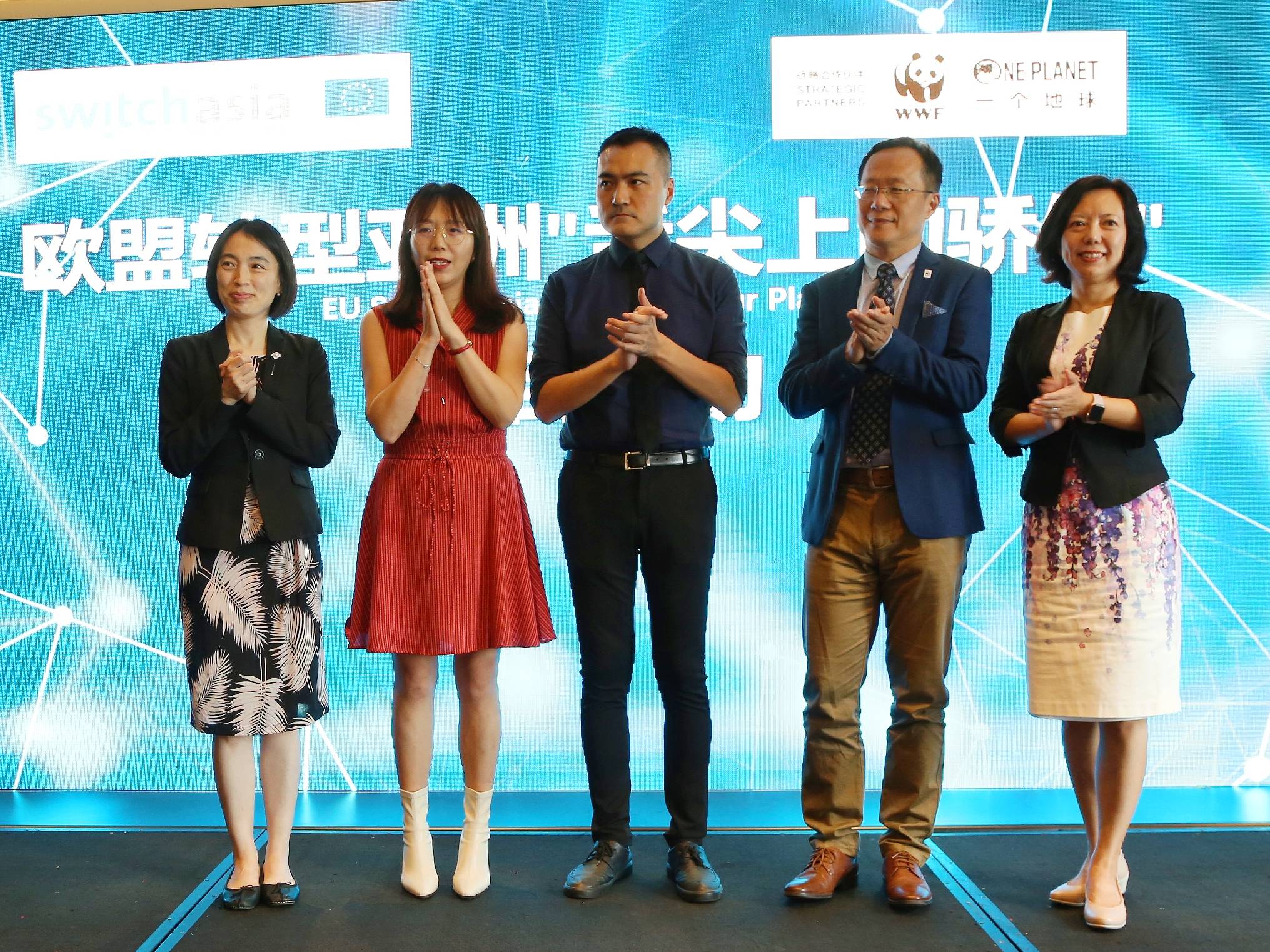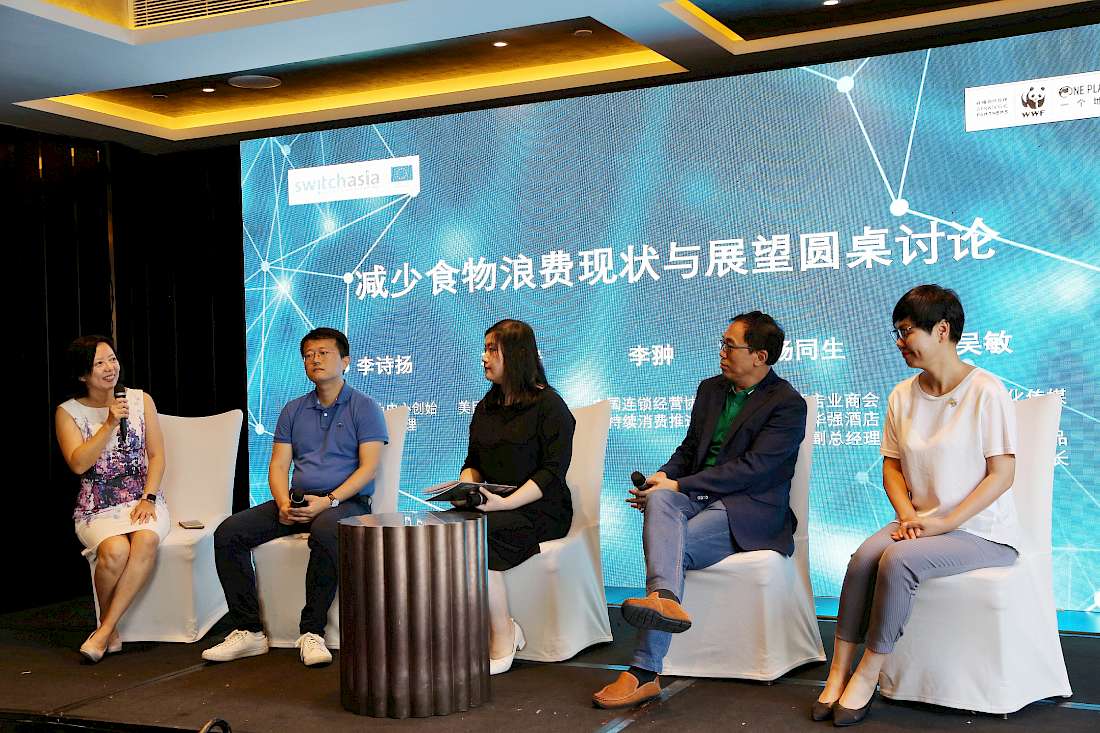
On September 17, One Planet Foundation (OPF) launched the EU SWITCH-Asia Pride on our Plates project together with its strategy partner World Wide Fund for Nature Beijing Office (WWF China), as well as Rare Germany and Rare Behavior Center. The project calls on China's micro, small, and medium-sized enterprises (MSMEs) to join together in addressing the food waste challenge through sustainable consumption and production (SCP). More than 100 representatives from governments, associations, academia, environmental organizations and businesses attended the meeting. Experts discussed how to effectively reduce food waste through tool design, cutting-edge concepts and best practices, and promote the operation model and solution to the industry during the panel discussion.
Food loss and waste is a common phenomenon around the world. One third of the food intended for human consumption is lost and wasted every year. According to the 2018 “Report on Food Waste in China's Urban Restaurants” jointly released by WWF China and the Institute of Geographic Sciences and Resources Research under the Chinese Academy of Sciences, China’s food waste on the dining table alone reached 17 to 18 million tons in 2015, equivalent to half of the food production volume (33.638 million tons) of Hebei province for the same year. Development trends in many countries suggests that food waste situation tend to increase as economy grows.
Solving the food waste problem through SCP is critical for global biodiversity conservation, climate change, and food safety. According to the report Enhancing Nationally Determined Contributions (NDCs) for Food Systems, if we take action to reduce food loss and waste, we would be able to reduce carbon dioxide equivalent by 4.5 billion tons annually, equivalent to 8% of the total global greenhouse gas emissions.
Lu Lunyan, Chief Operating Officer of WWF Beijing Office, said:
China has always been a country with rich cultures for delicious cuisines, food is incorporated in every aspect of our lives and culture. Although domestic food demand and supply is generally balanced with surplus every year, food wasted still cannot be neglected. In a vast country like China with significant agriculture production and population, building a long-lasting, stable, high-yield and sustainable food consumption market is crucial. For business organizations, strengthening the management of food waste not only serves as an action to protect the environment and demonstrate corporate’s responsibility, but also as a business strategy to reduce costs, increase efficiency and promote profits. This action in China will have a positive impact on global efforts to reduce food waste. The SWITCH-Asia ‘Pride on our Plates’ project will call on MSMEs in China to fight against food waste together.
The unexpected outbreak of COVID-19 in early 2020 was a wake-up call for the global food system. This black swan incident has led us to reflect on our lifestyle and diet, as well as pushed Chinese hospitality and catering industry to re-explore a more stable, sustainable and environmentally friendly way of doing business.
Zhou Fei, Chief Program Officer of WWF Beijing Office said: "WWF has been working on various environmental topics for the past years and has called on all stakeholders to halve food waste by 2030. Today, we will continue to do our best to empower the industry through the "Pride on our Plates" project. China's MSMEs accounted for 97% of the total number of companies across the food service industry. However, they have very limited access to education and campaign regarding food waste reduction. Enabling MSMEs to join the challenge of fighting food waste can promote the business model and standardization of food waste management across the industry, and will surely add another strength to this combat."
 Luo Yuannan, Secretary General of One Planet Foundation, said: "Our food production system depends tremendously on our natural resources such as land, air and water. As a foundation that has been dedicated to nature conservation, it is our wish to preserve natural resources by reducing food waste from its production, processing and consumption. One planet Foundation has been preparing for this SWITCH-Asia project and has received great support from the European Union. OPF welcomes more companies from catering, Internet, tourism, hospitality, and other sectors to join sustainable action to reduce food waste."
Luo Yuannan, Secretary General of One Planet Foundation, said: "Our food production system depends tremendously on our natural resources such as land, air and water. As a foundation that has been dedicated to nature conservation, it is our wish to preserve natural resources by reducing food waste from its production, processing and consumption. One planet Foundation has been preparing for this SWITCH-Asia project and has received great support from the European Union. OPF welcomes more companies from catering, Internet, tourism, hospitality, and other sectors to join sustainable action to reduce food waste."
Feng Mei, Programme Manager of the EU Delegation to China further explained: "The EU SWITCH-Asia programme aims to promote sustainable development and overall environmental performances throughout the production and consumption lifecycle in Asia, to stimulate demand for better products and production technologies, and to help consumers make wise choices. Since 2007, the program has invested nearly 300 million euros and funded about 130 grant projects in 24 countries. Through the launch of "Pride on our Plates", we look forward to calling on MSMEs in China to join the challenge of fighting food waste and reduce the impact of the food system on the environment by better managing and reducing food waste." She also explained that the new "European Green Deal" and a series of policies, including the "Circular Economy Action Plan" and the "Farm to Fork Strategy" highlight the critical role of strengthening supply chain sustainability and recycling in achieving the global green transition. In the context of post-pandemic and green recovery, it is expected that this project will also provide new ideas and models for innovation and sustainable financing, as well as enhance exchanges and experience sharing with other partner countries of the SWITCH-Asia programme.
As one of the project partners, the founder of Rare Behavior Center, Li Shiyang said, Rare Behavior Center will team up with Rare Germany, OPF and WWF China, to apply Behavior-Centered Design approach and insights from local culture to develop strategies and tools to reduce food waste. We will also widely reach businesses and consumers in China and share the experience across Europe.
 The objectives of the project include:
The objectives of the project include:
- Promoting MSMEs to adopt processes and services that maximize resource use, including real reductions in food waste;
- Developing food waste policy proposals to raise awareness of sustainable consumption and production (SCP) and disseminate knowledge for broader model replication, strengthen policy dialogue and support food waste-related policies;
- Through behavior-conducted design (BCD), food waste reduction training will be provided to MSMEs, and education will be widely disseminated to improve enterprises' and consumers' awareness of sustainable consumption and production.
Relevant stakeholders in China have already taken actions and shared information at the forum. Yang Tongsheng, Vice President of Shenzhen Hotel Industry Chamber of Commerce, shared his hotel management experiences. He had seen many food wastes from fete events, especially celebrations like wedding banquet where hosts tend to show their social status by ordering a large amount of food. Therefore, the clean-plate movement is essential to solving food waste not only for companies, but more importantly from the country's policy-making level and the top-level design. The whole society needs to form such an economizing and anti-waste notion, and shift from an uncontrolled shopping behavior to a more rational one. Shi Dayan, Government Relationship Director of South China for Meituan.com, pointed out that MSMEs are usually the group being neglected on this issue. Catering companies all wish to find their niche under the trend of lean management and fierce competitive situation. Most MSMEs are trying to find a breakthrough solution for high quality and low-price products. For example, providing a larger portion or use more oil for the same price, which in turn results in large amount of waste. This occurs more often especially for food stalls and MSMEs. The profit space and turnover are compressed. Therefore, there’s still a lot to do for MSMEs to combat food waste.
By 2024, we plan to have at least 350 employees in MSMEs trained in food waste prevention, reduction, and diversion. 100 employees in MSMEs will adopt sustainable consumption and production practices. 50 employees in MSMEs in the hotel and catering industry will reduce food waste by at least 10%. And the Food Waste Practice Guidance for MSMEs will be more widely applied in the hotel and catering industry and promoted to relevant members.
In achieving these objectives, the EU-SWITCH-Asia Pride on our Plates project hopes to contribute to the achievement of the Sustainable Development Goals (SDGs) Target 12.3, focused on reducing global per capita food waste to half at the retail and consumer levels and reduce food losses along production and supply chains, including post-harvest losses.
Original article featured at One Planet Foundation (in Chinese)


